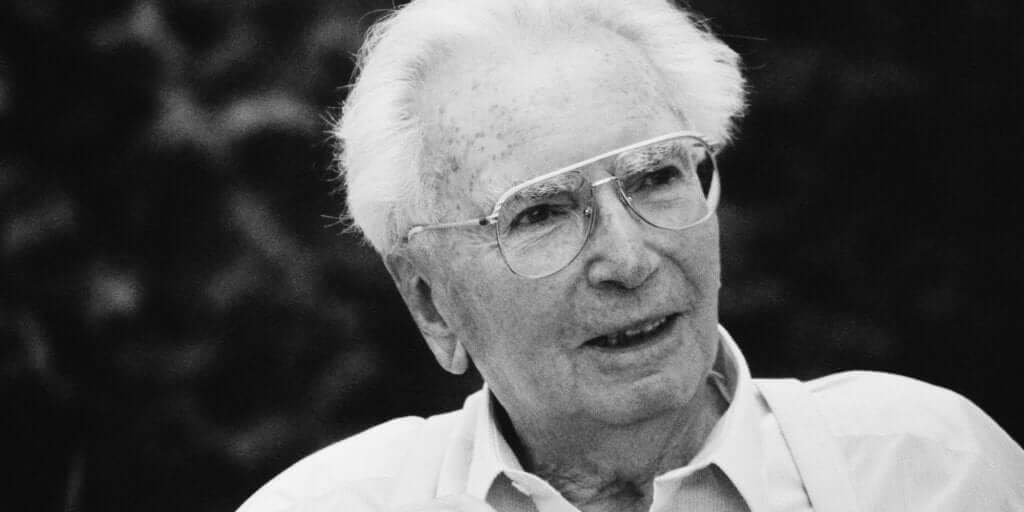Today, Viktor Frankl and his teachings on resilience are more necessary than ever. The famous psychiatrist said that in concentration camps he made a mental effort, imagined himself in the not too distant future, giving lectures to many people explaining how to deal with the trauma of war.
It worked for him; this allowed him to find an inner refuge to maintain his hope for safety, his psychological strength, set a goal on his horizon and turned that goal into an anchor to hold on to.
- He could understand the inexplicable.
- He wanted horror and suffering to have a vital meaning: an apprenticeship to teach others how to deal with emotional pain.
His classes and psychotherapy never went out of style, so although Viktor Frankl did not talk about resilience as such (but resistance), we can take his lessons as a substrate to better understand this concept.
“The important thing is not what we expect from life, but what life expects of us. “Viktor Frankl?
The concept of resilience has its origin in the world of physics and engineering, this is the property that some materials have when they return to their original state after suffering a shock or disturbance (this would be similar to the elasticity of tires). The field of psychology used this term to apply it to his study of the 1940s.
Norman Garmezy, professor emeritus at the University of Minnesota at Minneapolis, was one of the first to use this metaphor for a real physical phenomenon.
In their research on the world of schizophrenia he discovered something impressive: the children of these patients who have suffered from this disease have generally not inherited this disease, in addition, they used to show highly resilient and qualified personalities, with high levels of personality. Overtaking.
Experiences in their homes shaped them in a way Garmezy defined as “resilient personalities. “At the same time, Maurice Vanderpol, former president of the Boston Society and Psychoanalytic Institute, was also able to demonstrate that many of the survivors concentration camps had the same characteristic. Viktor Frankl was one of those examples.
The kind of therapy he created and applied to his patients had that goal, to help people give new meaning to their lives, to create a tougher personality with which to find a goal to move forward, those would be the keys.
“It is our decisions, not our conditions, that determine who we are. “Viktor Frankl?
It’s always a good time to go back to Viktor Frankl and his teachings on resilience, what we’ll understand when we read his work and see his lectures is that nothing is as decisive as accepting the reality we need to live. you can’t control what’s going on. Adversity usually has a chaotic component that is beyond us.
In this context, it is only acceptance. There’s no point in trying to figure out the “why. “We have to focus on how and for what. What can I do to meet this challenge?
“The meaning of my life is to help others find the meaning of their lives. “Viktor Frankl?
Viktor Frankl recounts in his books that life in the concentration camp was reduced to wondering if he could exchange a cigarette for a bowl of soup and if that sadistic foreman he worked with from time to time killed him that day or the next day.
In the midst of this scenario of constant anguish, where absurdity and horror were constant, he decided to find a mechanism with which he felt motivated to survive.
I wanted to make sense of everything I saw, felt and suffered, each of these things is a learning experience, it is said, and tomorrow I can use them to help others overcome their traumas, that was their goal and that helped him succeed. Live, so in the midst of all the difficulties, this must also be our strategy.
We need to clarify our goals and fight for them. So, as Frankl himself said, “once we make sense of life, we not only feel a little better, but we also find the ability to face suffering. “
Our attitude to life and our own difficulties is, according to Frankl, what determines our ability to face everything, and it is up to us to choose the most appropriate attitude: not to give up, to maintain hope and to have confidence that our past should not determine our future.
Our own attitude and ability to transform ourselves to cope with adversity are part of Viktor Frankl’s legacy and his teachings on resilience, as he explained, it is not the context or circumstances that determine us, what really affects us are our choices and our thoughts. .
Then we have to deal with that. Let us consider these ideas and try, as far as possible, to apply these lessons from the father of logotherapy in our lives.
“Our greatest freedom is the freedom to choose our attitude. “Viktor Frankl?

